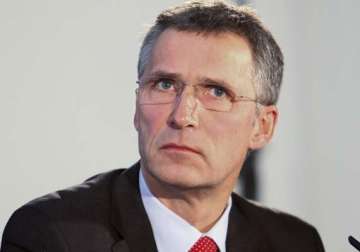Brussels: NATO nations today agreed to bolster its defenses against Russian aggression, continuing the military alliance's return to its founding mission by focusing on nearby threats as it steps back from more than a decade of combat in Afghanistan.
The 28 member countries approved a new interim quick-reaction military force to protect themselves from Russia or other threats, with an initial unit to be up and running on Jan. 1, NATO Secretary-General Jens Stoltenberg said. The interim force will be supplanted in 2016 by a permanent one, Stoltenberg said.
“We are protecting our allies and supporting our partners,” Stoltenberg told reporters at an annual meeting of NATO's foreign ministers.
US Secretary of State John Kerry urged diplomats from other nations to contribute their fair share to the alliance, noting “we can't have 21st century security on the cheap.”
It was likely to be the last meeting of foreign ministers who oversaw the International Security Assistance Force, made up largely of NATO troops, which has sought to stabilize Afghanistan since shortly after the 2001 invasion.
“In one way or another, we have been tested repeatedly by those who want to divide us, or to cause us to retreat from the basic commitments that we have made to one another both within and beyond the NATO arena,” Kerry said. “These tests are difficult, and they will continue to be difficult in the new year. But history has shown just how tough the alliance of free nations can be.”
Later today, the ministers were expected to authorize the launch of an advisory mission in Afghanistan on Jan. 1, when NATO-led combat operations there are scheduled to end.
The diplomats also approved maintaining measures through 2015 initiated to reassure NATO nations nearest Russia, Stoltenberg said. Such measures include stepped-up air patrols over the Baltic Sea and the continuous rotation of NATO military units in and out of countries like Poland and Baltic republics.
A senior NATO official, speaking to journalists on condition he not be identified by name, said the brigade-sized land-based component of the force, about 3,000-4,000 troops contributed by Germany, Norway and the Netherlands, is expected to be operational as of Jan. 1.
The military ramp-up was largely spurred by Russia's aggressive actions in neighboring Ukraine.
Kerry said the US has so far provided USD 118 million in assistance and training to Kiev, and wouldn't rule out sending lethal aid to Ukraine's government, although he made clear that is currently not being considered.
Latest World News
